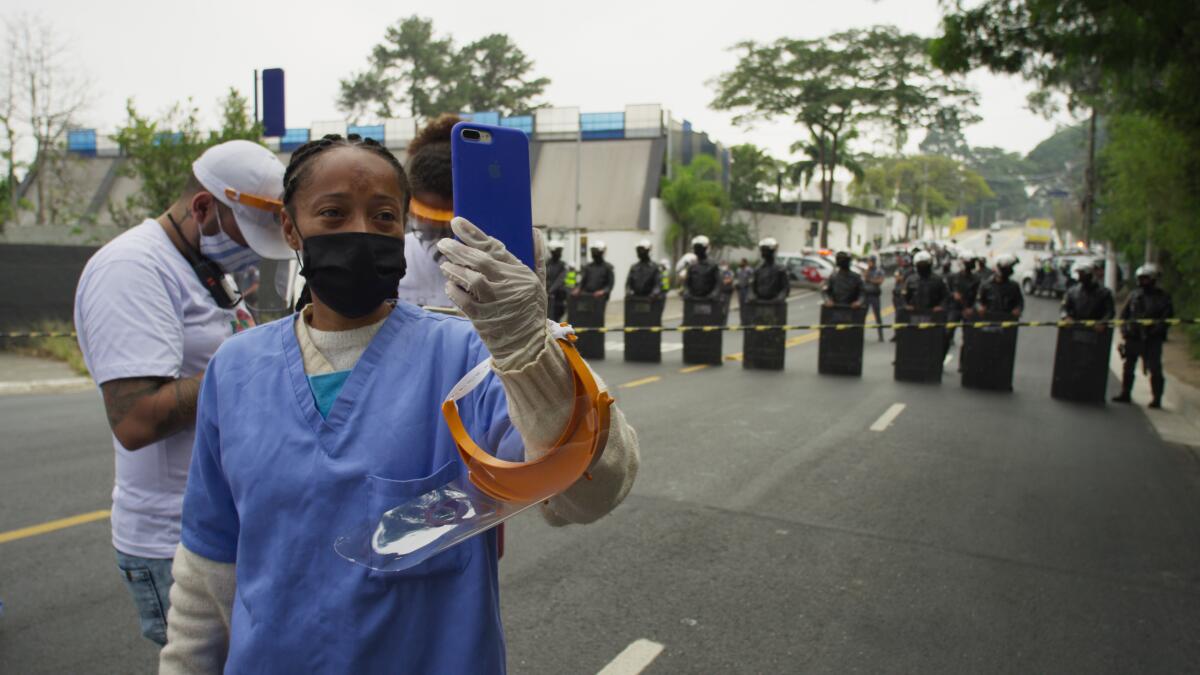Review: âConvergence: Courage in a Crisisâ provides a hurried view of COVID-19 activists

The Times is committed to reviewing theatrical film releases during the COVID-19 pandemic. Because moviegoing carries risks during this time, we remind readers to follow health and safety guidelines as outlined by the Centers for Disease Control and Prevention and local health officials.
COVID-19 documentaries are only a year or so old but theyâre already proving to be a varied bunch, from the immersive war-zone approach (â76 Daysâ) to the how-did-this-happen rundown (âTotally Under Controlâ) to the sobering mixture of both (âIn the Same Breathâ). What theyâve shared so far, however â because itâs impossible to ignore â is an acknowledgement (whether expressed in passing or expressly shown) of whoâs bearing the brunt of the catastrophe: everyday people whose hard lives were only exacerbated by the global spread of a deadly virus.
Little has been fixed about the broken systems that made the pandemic worse for so many. But social issue documentarian Orlando von Einsiedelâs mosaic âConvergence: Courage in a Crisis,â a portrait of citizens from around the world dealing with the first year of the pandemic, looks to keep a viewerâs possibly jaded eye on that oft-invoked beacon of common humanity. It strives to show hope for a better future as still a viable emotion after all thatâs happened, all thatâs been lost and exposed.
Von Einsiedel has a solid track record with social-issue documentaries built around heroes taking action (âVirunga,â âThe White Helmetsâ). Itâs perhaps no surprise, then, that he and a team of continents-spanning co-directors (10 in all) sought a lens through which to spotlight people on the frontlines, from a Wuhan vloggerâs volunteering to drive medical workers during lockdown, to a London-based Syrian refugee and documentary filmmaker applying to be a hospital cleaner to do his part (for queen and camera).
Some are unforgettable figures. We meet Dr. Rosa Luz Lopez, a dedicated ICU head at an underfunded hospital in Lima, Peru, whose fellow doctors gradually become patients, and who bemoans how lack of education creates a poor populace under-prepared for a pandemic. Renata Alves, a Black woman from one of SĂŁo Paoloâs largest favelas, volunteers to work on a private ambulance because it bothers her to stay home when her community is ignored by the governmentâs health services. In Miami, we see activist and family man Dr. Armen Henderson juggle hospital work, community health initiatives, protest efforts and, at one point getting racially profiled by police outside his own home.
Less interesting in comparison â because how could they not be â are a Tehran coupleâs shelter-in-place videos (theyâre good citizens by staying home, but thatâs about it), a pregnant wife in Delhi shown in unremarkable glimpses, and a few peeks inside strategizing meetings at the World Health Organization that, as presented here, feel like excuses to inject appropriately authoritative institutional responses about What Must Be Done.
There are also gentle musical breaks of people who posted home performances during the pandemic, and occasional interludes of virtual social interactions (weddings, parties, funerals) to help fill in the how-we-got-by tapestry. But these crowdsourced interstitials donât always go well tonally with the movieâs main stories of people experiencing life and death every day, pinballing between grim realities, altruism and self-care. When âConvergenceâ feels rushed for trying to squeeze in a global snapshot, its impact is diluted.
The montage of interconnectedness that speaks best to the movieâs thematic spirit of change through crisis is when the timeline reaches the worldwide protests sparked by George Floydâs killing. Thatâs when whatâs been seeded emotionally by the movieâs strongest characters (who maybe should have been the only characters) achieves a fragrant bloom, reminding us of what we all felt that summer when anger, fatigue and compassion became loud, unmissable calls for a more just world.
We then see in the film how that outspokenness can produce results, as when Hassan, the Syrian refugee in London, takes to social media to call out the U.K. governmentâs excluding of migrant support staff from an announced benefit program for healthcare workers, and miraculously makes an impact. Moments like that give the well-intentioned if scattershot âConvergenceâ its wished-for inspiration much more readily than ending with the easy uplift of a mass-Zoom âLean on Meâ sing-along.
'Convergence: Courage in a Crisis'
Rated: R, for some language
Running time: 1 hour, 53 minutes
Playing: Starts Oct. 8, Laemmle Monica, Santa Monica; available Oct. 12 on Netflix
More to Read
Only good movies
Get the Indie Focus newsletter, Mark Olsen's weekly guide to the world of cinema.
You may occasionally receive promotional content from the Los Angeles Times.










